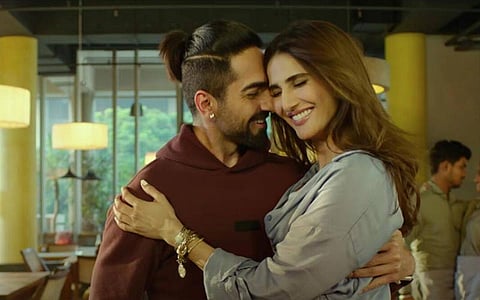
- Reviews
- Power List 2024
- Cannes 2024
- In-Depth Stories
- Web Stories
- News
- FC Lists
- Interviews
- Features
- FC SpecialsFC Specials

It might be of help to first situate Chandigarh Kare Aashiqui among the other commercial attempts at telling stories of queer people (not queer stories, there's a difference). In these films or shows, queerness — homosexuality in Dostana, Shubh Mangal Zyada Saavdhan, Ek Ladki Ko Dekha Toh Aisa Laga, His Storyy, The Married Woman, transness in Laxmii and Pati Patni Aur Panga — is the conflict. What usually happens is that under the grinding weight of this conflict, the queer characters become receptacles of tragedy, without any interiority, any joy, or character building. They are cloying and sincere, even when they are horny creatures, with tented pants, who just want to bang. Their queerness is everything you need to know about them. In Shubh Mangal Zyada Saavdhan, for example, you don't know anything about Ayushmann Khurranna's or Jeetu's character save for their respective confident and coy embodiments of their homosexuality. Their past is a ghost that needs no tending.
The difference with Chandigarh Kare Aashiqui is that while the conflict is queerness — a straight man falls in love with a trans woman — the protagonist isn't queer. The protagonist is the man, Manvinder Munjal aka Manu (Ayushmann Khurrana), a fitness enthusiast who runs a gym, "Jatts Flex It". He falls in love with a Zumba instructor Maanvi Brar (Vaani Kapoor) who rents out an adjacent space at the gym for her classes. They meet, they fuck, they fall in love. The conflict here is that Maanvi is a trans woman. Manu's reaction is first doubt, then rage, then humiliation, then revenge. The arc of the protagonist is given to him. Maanvi is on the sidelines, dressed fashionably in denim and neon, waiting for Manu to boomerang back in love and acceptance.
The film, to its credit, announces Maanvi's transness casually — the pills she takes in the morning, the visits to the doctor, the conversations with a friend. This is unlike, say, Ek Ladki Ko Dekha Toh Aisa Laga, where Sonam Kapoor comes out as a lesbian only before the interval to Rajkummar Rao laughing in hysteric doubt. Chandigarh Kare Aashiqui also takes her transness seriously. When Manu is trying to educate himself on YouTube, there is an entire montage of trans women — writer Gazal Dhaliwal on Satyamev Jayate, Dr. Trinetra Haldar Gummaraju at TedX, among others — explaining their life stories. There is even, oddly, an entire medical demonstration of the procedure of the Sex Reassignment Surgery (SRS). As a mythological burnish, there is also a poster of Ardhanarishwara — half Shiva, half Shakti — on Maanvi's wall. The film wants to announce its sincerity, or short circuit any criticism of not doing or showing or caring enough. Whatever the reason, there is no strain of transphobia here. Just a cautionary tale of what empty gestures of commercial queer storytelling can look like.
There is even a scene — completely dubious, completely shallow, completely sincere — where Manu asks a trans woman begging to sit with him over coffee and melt his inner transphobia. She spouts Shakespeare. We are told she is college educated. Why, then, beg? This kind of complexity, Chandigarh Kare Aashiqui is both incapable and unwilling to delve into. To be trans, in the limited worldview of this movie, is to be a catalyst. Similarly, the film refuses to even jostle with the contention that to have women doing zumba in full view of leering men at a sweat-stained gym is wishful thinking. Maanvi doesn't feel awkward, threatened, or violated by their gaze. The camera, in fact, courts her posterior in close-ups, and she serves. There is even a scene where she announces to the police — not the most trans friendly institution, by any stretch of imagination — unnecessarily, without being prodded, that she is a trans woman.
The problem with the movie, narratively speaking, is that often it is unable to distinguish satire from sincerity. Take the scene where Maanvi tells Manu about her past. In anger he tells her to leave the house. She coyly responds, "Yeh mera ghar hai." In the trailer, this is playing to a peppy soundtrack, as if there is comedy here. In the movie, I wasn't sure. Was this moment designed for humour or pathos? I felt a bit of both, and this keeps happening through the film — an inability to commit to a feeling.
Written by Abhishek Kapoor, Supratik Sen, and Tushar Paranjape, the film, under 2 hours, is, however, extremely light on its feet, establishing characters, back stories, and context with sharp economy. No scene stretches beyond the point it has made, however haphazardly, with Khurrana's rooted charm and Kapoor's anglophone oomph. So the culminating moments of joy, of being boomeranged back to love, is also crisp and celebratory. It involves Manu in a competition trying to become GOAT — Gabru Of All Time. The final moment in the competition, when the film comes out of the closet as a sports film, involves him trying to lift a 150 kg weight. It would clinch him his much needed victory. He needs his dose of hope. He finds Maanvi, standing on the sidelines, miming him to breathe. Fitting, for that is, afterall, where she was was located in the film's narrative all along.